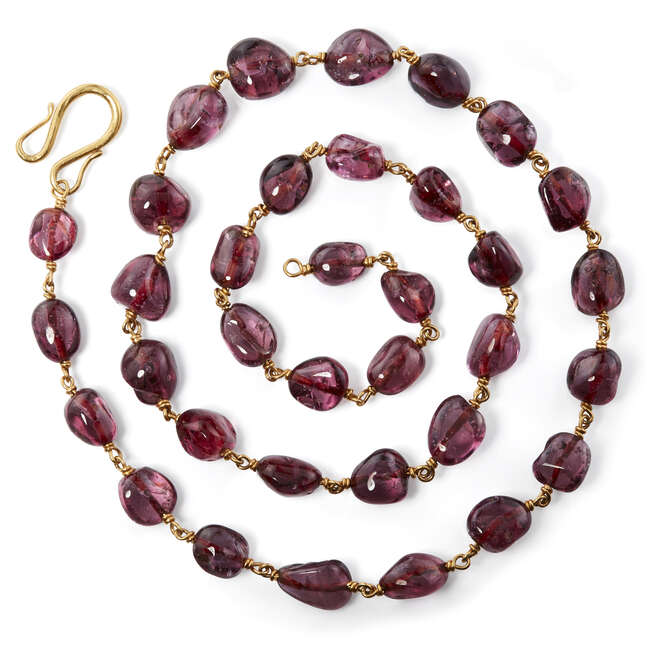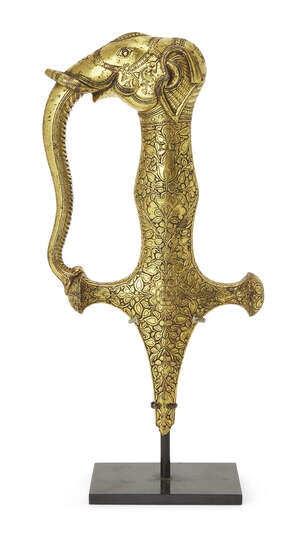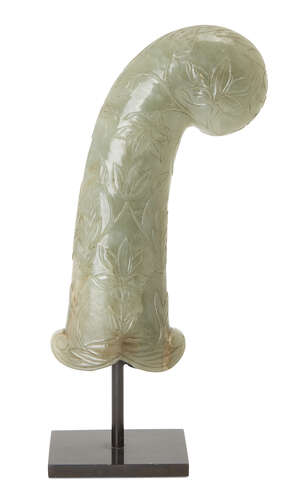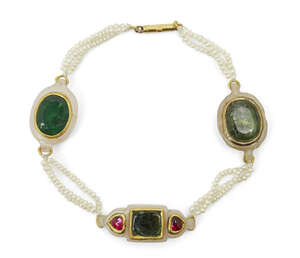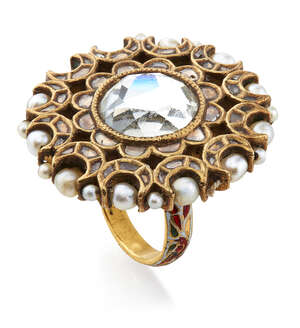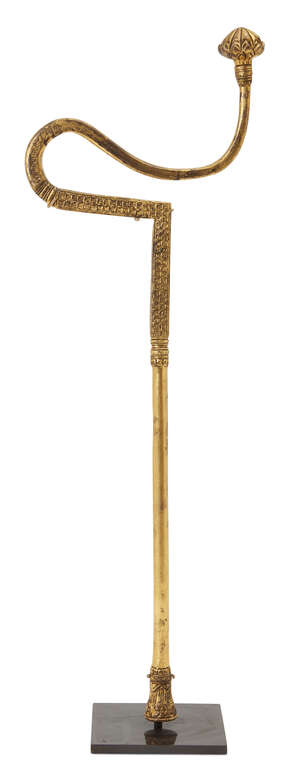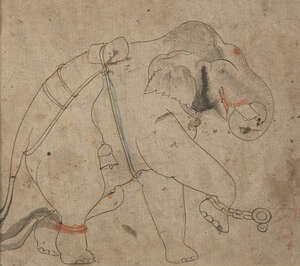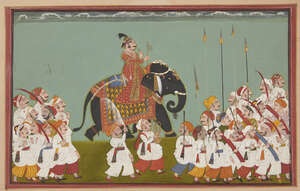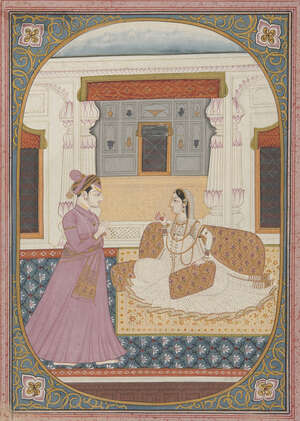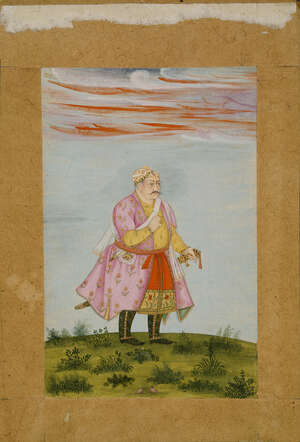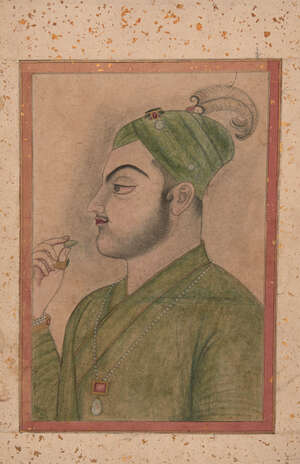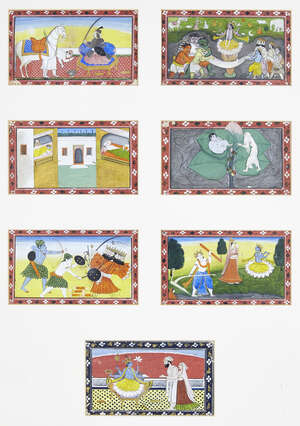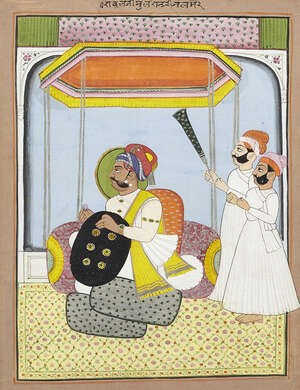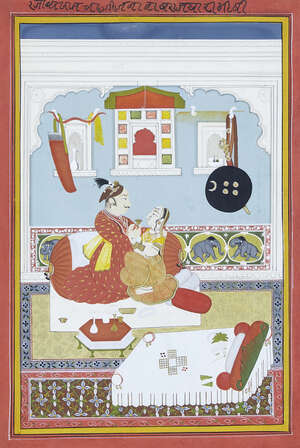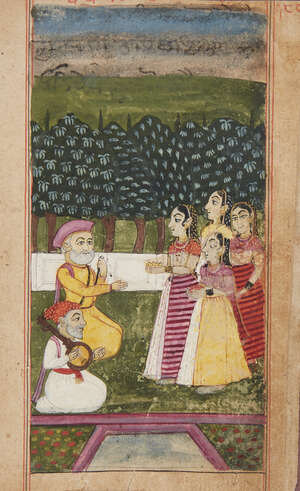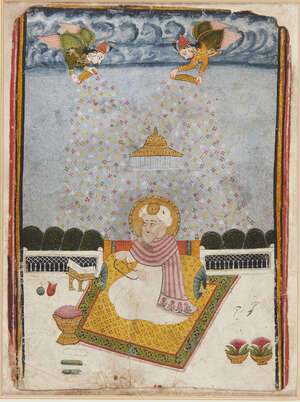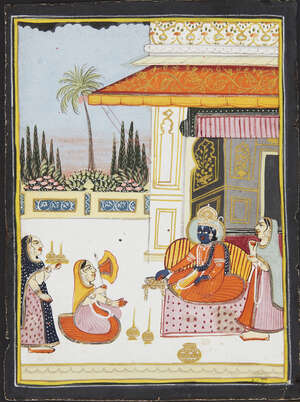Tuesday 15 June 2021
A spinel necklace, India, with thirty-seven polished spinels, each weighing between 12-15...
View MoreLot 75
Description
A spinel necklace, India, with thirty-seven polished spinels, each weighing between 12-15 carats, with gold wire links and gold hook clasp, 72cm. long, weight 93.4 grams (including the 23.5 carat gold wire)
Mughal emperors have had, for centuries, a particular love for precious stones. The references found in numerous memoirs and chronicles of this period show the strong cultural belief in gemstone properties. The Timurids, ancestors of the Mughals, introduced the tradition of engraving titles and names on stones of outstanding quality and, along with diamonds and emeralds, large spinel beads were certainly among their favourites. Emperors commissioned special officials to search for spectacular stones, that they would then wear in multiple strand necklaces to adorn their outfits. As much as these gems were a symbol of the opulence and dignity of the empire, they were also treasured as protective talismans.
Akbar the Great (1542-1605), third Mughal emperor, collected spinels, wearing them most often directly on the skin, as a 'life-protector' for their blood-red colour, mounted as pendants or bazubands (upper arm bracelets), or simply holding them in his hand. A legend says that the Rulers were to wear three spinels during battles to protect them from injuries and death. Akbar's son, Emperor Jahangir (1569-1627), followed the family tradition as a great connoisseur of gems, and was even described by a contemporary English visitor, the Rev. Edward Terry, as the 'greatest and richest master of precious stones that inhabits the whole earth.' (Pal, op. cit., p. 131). His legendary passion was continued by his son, Shah Jahan, (1592-1666), best known for constructing the Taj Mahal at Agra, one of the most romantic and magnificent architectural wonders in the world, and then by his successor, Emperor Alamgir (1618-1707), also known as Aurangzeb.
Although the polish of many of the beads in this necklace appears to be an old soft polish, the absence of any inscriptions or identifying qualities makes it difficult to date these beads precisely. As a group, however, since they are of similar size and shape, it would have taken considerable effort, time and expense to compose.
For similar beads see M. Keene, Treasury of the World: Jewelled Arts of India in the Age of the Mughals, London 2001, p. 130 nos. LNS1765 Ja-c.
Fees & VAT
Buyer's Premium
The buyer shall pay the hammer price together with a premium thereon of 26% up to £20,000 (31.2% inclusive of VAT), 25% from £20,001 - £500,000 (30% inclusive of VAT), 20% from £500,001 thereafter (24% inclusive of VAT). The premium price is subject to VAT at the standard rate.
VAT
VAT is not charged on the hammer price unless it is stated that there is 'VAT applicable on the hammer price at the end of the description. Buyer's premium is subject to VAT.(ARR) - ARTIST'S RESALE RIGHT
Qualifying living artists and the descendants of artists deceased within the last 70 years are entitled to receive a re-sale royalty each time their work is bought through an auction house or art market professional.
It applies to lots with hammer value over £1,000 as follows:
0 to £50,000 - 4%
£50,000.01 to £200,000 - 3%
£200,000.01 to £350,000 - 1%
£350,000.01 to £500,000 - 0.5%
Exceeding £500,000 - 0.25%
ARR is capped at £12,500
Please note ARR is calculated in euros. Auctioneers will apply current exchange rates.
Export of goods
Buyers intending to export goods should ascertain whether an export licence is required before bidding. Export licences are issued by Arts Council England and application forms can be obtained from its Export Licensing Unit. Details can be found on the ACE website www.artscouncil.org.uk or by phoning ACE on 020 7973 5188. The need for import licences varies from country to country and you should acquaint yourself with all relevant local requirements and provisions before bidding. The refusal of any such licences shall not permit the cancelling of any sale nor allow any delay in making full payment for the lot.
Own a similar item?
Request a ValuationReceive alerts about similar lots
Get StartedContinue Browsing
LOT 76
A Kutch finely chased gold sword hilt in the form of an elephant (talwar), India, late...
Estimate: £3000 - £5000
LOT 77
A Mughal carved green jade hilt, India,18th century, of pistol grip form, carved with...
Estimate: £3000 - £5000
LOT 78
A gem-set jade and seed pearl bracelet, India, late 19th century, with three jade...
Estimate: £600 - £800
LOT 79
RTO A gold mirror ring, India, 19th century, of floral shape inlaid with mirror and...
Estimate: £2000 - £3000
LOT 80
A Dervish crutch with gilding and inscription, North India, probably Punjab, 19th...
Estimate: £1200 - £1500
LOT 81
A drawing of a captive elephant, Kotah school, India, circa 1840, pen and gouache on...
Estimate: £100 - £200
LOT 82
A large painting of a processional scene, Udaipur, Rajasthan, India, circa 1750, opaque...
Estimate: £1000 - £1500
LOT 83
The Heroine Annoyed with her Faithless Lover, a folio from a Rakisapriya Series, Kangra,...
Estimate: £4000 - £6000
LOT 84
Raja Udai Singh (Mota Raja) of Marwar, Rajasthan, North India, early 19th century, opaque...
Estimate: £400 - £600
LOT 85
A large portrait of Muhammad Azam Shah (r. 14 March 1707 - 8 June 1707), Kishangargh...
Estimate: £1000 - £1500
LOT 86
A series of twenty-one illustrations from a small manuscript, Kangra, India, circa 1800,...
Estimate: £1200 - £1500
LOT 87
A seated ruler and attendants, Mewar, Punjab, India, circa 1900, opaque pigments...
Estimate: £300 - £400
LOT 88
An amorous couple seated in their bedroom, Mewar, Udaipur, India, early 19th century,...
Estimate: £500 - £700
LOT 89
An illustration from a Ragamala from a manuscript, Western India, circa 1720, opaque...
Estimate: £200 - £300
LOT 90
A Pandi (priest) receiving a shower of flower blossoms and holding a rose wreath, Deccan,...
Estimate: £200 - £300
LOT 91
Rama and Sita seated on a terrace in conversation with attendants, Mewar, 19th century,...
Estimate: £200 - £300
 Newsletter Signup
Newsletter Signup
 Keyword Alerts
Keyword Alerts
Would you like to receive personalised keyword alerts when new catalogues go live. If so, please indicate these below
Set a password to save your keyword alerts
Passwords are a minimum of 7 characters and must include an upper case letter, a lower case letter, a number and a special character (e.g., !@#$%^&*).


